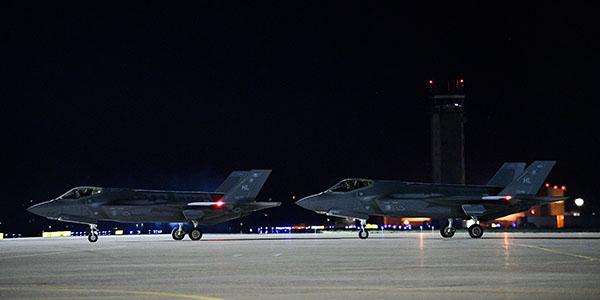China is Retooling, and Russia Seeks Harm to Critical Infrastructure
U.S. adversaries are trying to take control of cyberspace as a medium, resulting in implications to our freedom of maneuver and access in cyberspace, says Brig. Gen. Gregory Gagnon, USAF, director of Intelligence (A2), Headquarters Air Combat Command (ACC), Joint Base Langley-Eustis. Increasing cyberspace activity is coming from China, Russia, Iran and North Korea.
“We are seeing it not just in volume, but we are seeing an expansion in the ways that they use cyberspace, whether it is to steal information, whether it is to directly influence our citizens or whether it is to disrupt critical infrastructure,” Gen. Gagnon reports. The general spoke at the AFCEA Tidewater chapter’s recent monthly virtual luncheon.
China and Russia continue to pose the greatest espionage and cyber attack threats to the United States, but the intelligence leader anticipates that other adversaries and strategic competitors will also build and integrate cyber espionage, cyber attacks and influence operations into how they conduct business.
“Our strategic competitors will increasingly use cyber space capabilities including cyber espionage, cyber attack and continued influence operations to seek political, economic and military advantage over the United States, our allies and our partners,” he said. “This is not an ‘if,’ it is a yes. They are doing it and they will continue.”
Gen. Gagnon warned that China in particular is using cyber espionage to collect intelligence, target critical infrastructure and steal intellectual property. It is all part of China’s plan to move from being a regional actor to being seen as a global power. The shift also means a greater role for the adversary’s military. The Chinese military is in the process of transitioning from a defensive, inflexible ground-based force charged with domestic and peripheral security to a joint, highly agile, expeditionary and power projecting arm of Chinese foreign policy, he noted.
“What is going on in China is a dynamic revectoring of the objectives and goals of the People's Liberation Army,” Gen. Gagnon said. “This is not a small change. This is a major change in course and direction. They're doing it to be a power projection arm of a Chinese foreign policy that engages both in military diplomacy and operations around the globe, but also in predatory economic activity.”
Moreover, China’s military spending in 2018 exceeded $200 billion, an increase of about 300% since 2002, the general stated. And while it is not the $750 billion that the United States government spends every year on military defense, the Chinese funding does not reflect the same level of investment in manpower or healthcare.
A good portion of their $200 billion directly funds technology and capabilities. “A big chunk of our budget is not buying kit,” Gen. Gagnon explained. “If you're the CCP [Chinese Communist Party], you don't have the same extensive retirement programs that you have to pay for,” he said. “You don't have this extensive healthcare which you have to provide. So, when you think about $200 billion, think about that buying kit and buying operations. That is significant.”
To the industry, Gen. Gagnon warned companies that Beijing will authorize Chinese espionage against key U.S technologies. “Many of your corporations hold this technology,” he stressed. “They are trying to undercut your ability to be profitable by developing those same technologies in China. They are competing against us in the international market. I will tell you that China's persistent cyber espionage threat and their growing tech threat to our core military and critical infrastructure will continue to be persistent. China remains the most active strategic competitor responsible for cyber espionage against corporations and allies.”
China, like Russia, is also increasing its information warfare against the United States. “They are becoming more adept at using social media to deliver messages directly to the U.S. population that alter the way we think, the way we behave and the way we decide,” the general observed.
The improvement of their cyber attack capabilities and ways to alter information online is intended to shape views inside China, shift the mindset of Chinese people around the world, as well as to try to shape the world’s view, not just of China, but also of the United States. “You are seeing that play out in the pandemic, how people view us around the world,” he offered.
“We're also concerned about Chinese intelligence and security services,” the A2 continued. “They use Chinese information technology firms as routine and systemic espionage platforms against the United States and against our allies. Many of you are tracking what is in the news about 5G and Huawei, and that's what we're talking about.”
As for Russia, their highly capable operations of cyber espionage, influence and cyber attacks continue to target the United States and its allies. In particular, Russia’s form of integrating cyber espionage attacks and influence operations, or information confrontation, is very effective, Gen. Gagnon emphasized. “If you think about it, they’re generally playing with the weaker hand, so they have been rather brilliant on the international stage in achieving their foreign policy objectives,” he said.
In addition, Moscow is staging cyberattack assets to disrupt or damage U.S. military or civilian information systems during the COVID-19 pandemic. “There is activity that they undertake on a day-to-day basis to try to gain a decisive military intelligence,” he stated. “Their security services continue to target our systems, both for U.S. information systems and critical infrastructure, as well as the networks of our NATO and Five-Eye partners. They do it for positional advantage in cyberspace to be able to do the five Ds: deceive, deny, disrupt, degrade and destroy our assets, but also to gain intelligence on how systems are established and set up so that they can maintain attack vectors.”
Russia also is targeting U.S. critical infrastructure, the general cautioned. “Russia has the ability to execute cyber attacks in the United States that can generate localized temporary disruptive effects on critical infrastructure, such as disrupting electric distribution networks for at least a few hours.”
In fact, he warned, Moscow is mapping out critical infrastructure with the long-term goal of being able to cause “substantial damage.”
You may also enjoy:





Comment
I think this is happening all
I think this is happening all over.
Comments